Review: Delaine Le Bas Incipit Vita Nova. Here Begins The New Life/A New Life Is Beginning at the Turner Prize, Tate Britain
January 8, 2025Delaine Le Bas – Incipit Vita Nova. Here Begins The New Life/A New Life Is Beginning a jerky, drippy, wondering and genuinely immersive exhibition installation on the themes of Death, the Oracle, Roma community and symbolism, and art itself.
Delaine Le Bas is a wild woman. I hope she won’t mind me saying so. I love what she does. The brief description on the Tate’s website reads “[the artist] transforms her surroundings into monumental immersive environments filled with painted fabrics, theatrical costumes, and sculptures. Her art draws on the rich cultural history of the Roma people and mythologies, focusing on themes of death, loss, and renewal.” I imagined something completely different. Of course, I was homing in on the fabric and costume side of things, and I thought this would be a good show to see and review for you, dear reader.
The Roma community is a huge one, and it spans many countries and ethnicities. I had imagined the heavy, richly colourful embroidery which is traditional to the Roma community in the former Yugoslavia. They have a particular fashion all to themselves, with colourful long skirts, blouses and a distinct way of dressing. I know artists from this community and their art focusses on these strengths and differences.
However, Roma is a wide umbrella term, one that Tate feels obliged to define. “Gypsy, Roma (or the gender-sensitive term Rom*nja – the female plural term for Roma is Romnja) and Traveller are terms used in the UK to represent several ethnic groups taht share several common historical and social traits. The principal commonality is their history of nomadism. The umbrella ter, GRT is used officially by the British Government and Travellers’ rights organisations. […] Le Bas asks “Who puts who in the boxes and who labels the boxes?” Well, quite.
Word soup
Suffice to say, Delaine Le Bas is white and British born, educated at the West Sussex College of Design and Central Saint Martins. More fool me for making assumptions and associations with other Roma artists. It’s an important biographical detail and certainly holds relevance for her art, but the description doesn’t tell you a thing about what you are going to see.
Maybe they should do it like contemporary menus where they mainly list ingredients. Like this, from Mildred’s
- Incipit Vita Nova. Here Begins The New Life/A New Life Is Beginning
Translucency, Sound, Monochromatism, Physical Reflectance. Contains mysticism & personal worldview
14/5
(Allergens: Hay. Trigger Warnings – mention of unaliving, persistent soundscape.)
On second thoughts, I don’t think that helps much either. But I like it and will adopt that vague and lofty way of writing when I write my next press release. Incidentally, the wall panels at Tate are no longer written by the curators of the show or by art experts. Or they may be, but they are reviewed and heavily edited by an inclusivity team who ensure that the wording and content is understandable for readers of a certain age – basically older children and up. And it makes sure to include all genders and sexualities, and acknowledge historic offensiveness or colonialist attitudes which may be depicted in the work. This positions the institutions more as educators for younger people which is fine, but becomes wearing and patronising for anyone else.
Delaine le Bas – Transcendant
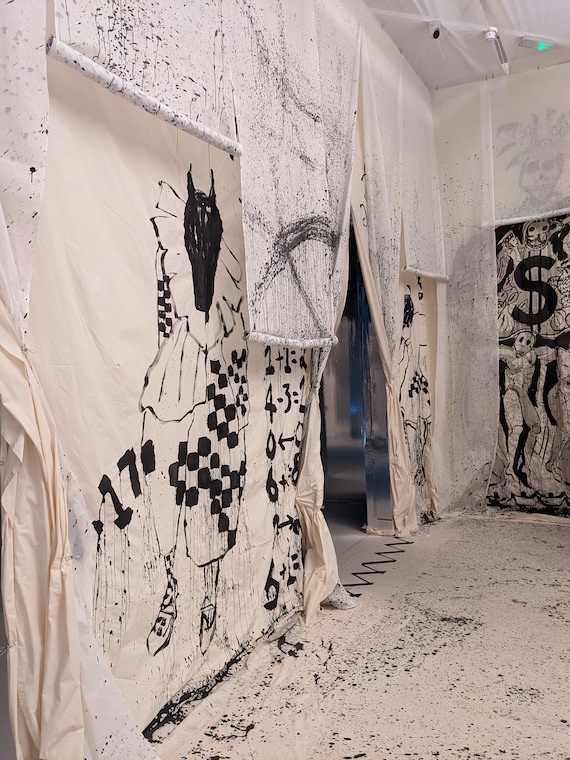
Delaine le Bas at Tate Britain. Photo G Jones
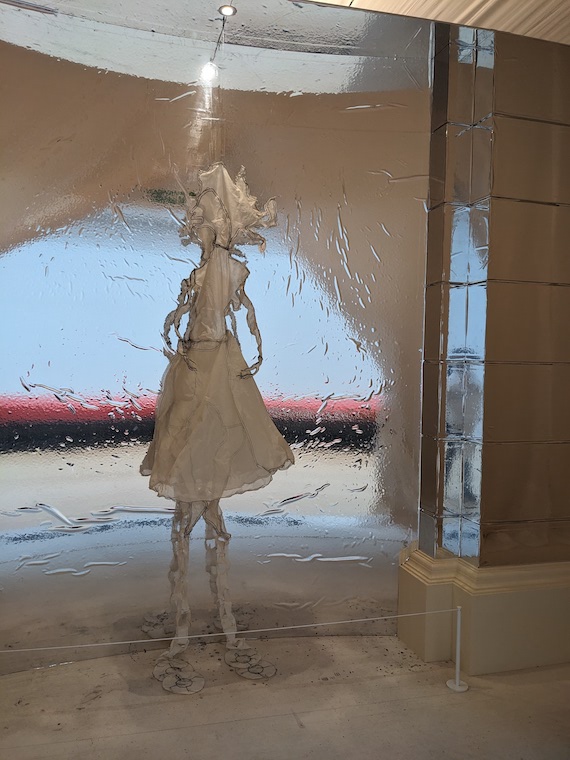
Delaine le Bas at Tate Britain. Photo G Jones
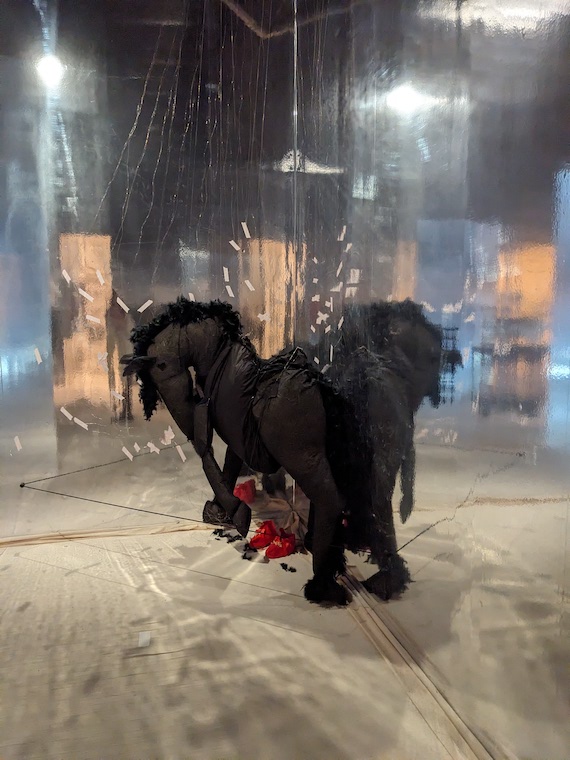
Delaine le Bas at Tate Britain. Photo G Jones
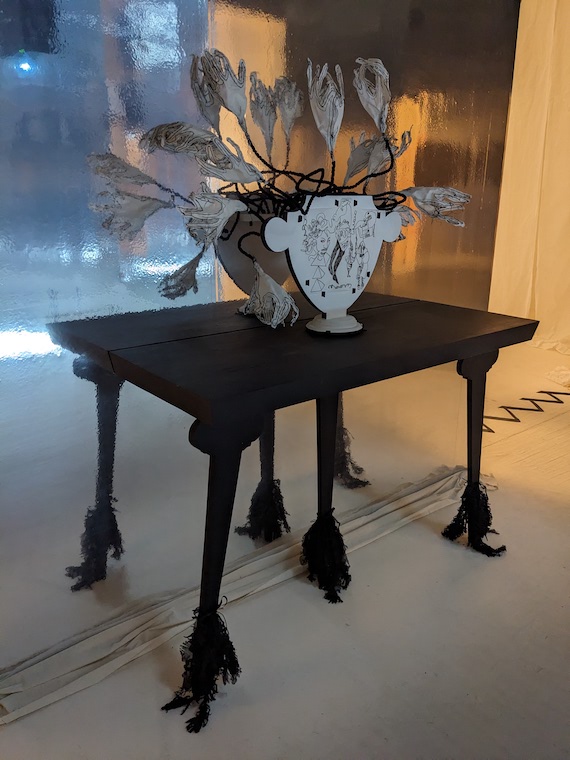
Delaine le Bas at Tate Britain. Photo G Jones
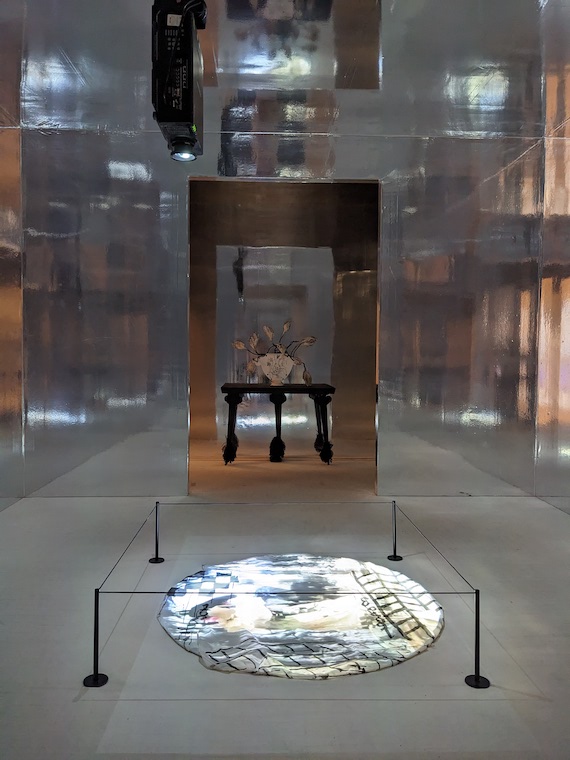
Delaine le Bas at Tate Britain. Photo G Jones
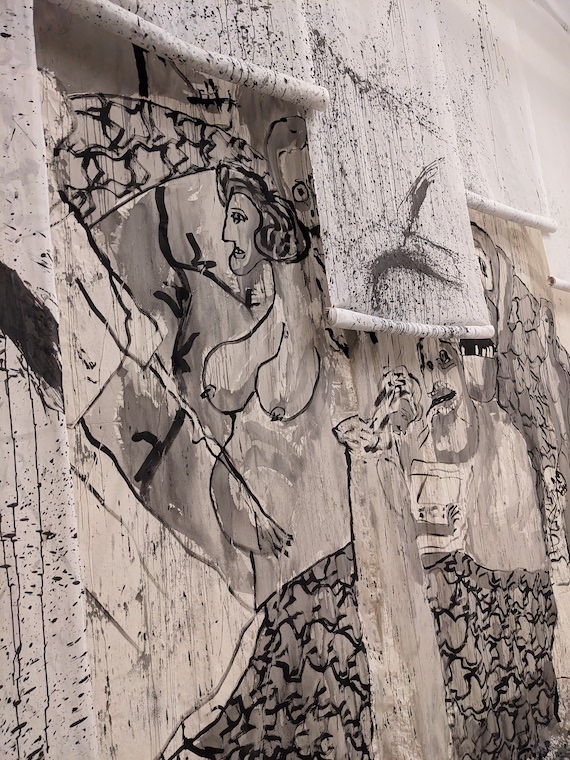
Delaine le Bas at Tate Britain. Photo G Jones
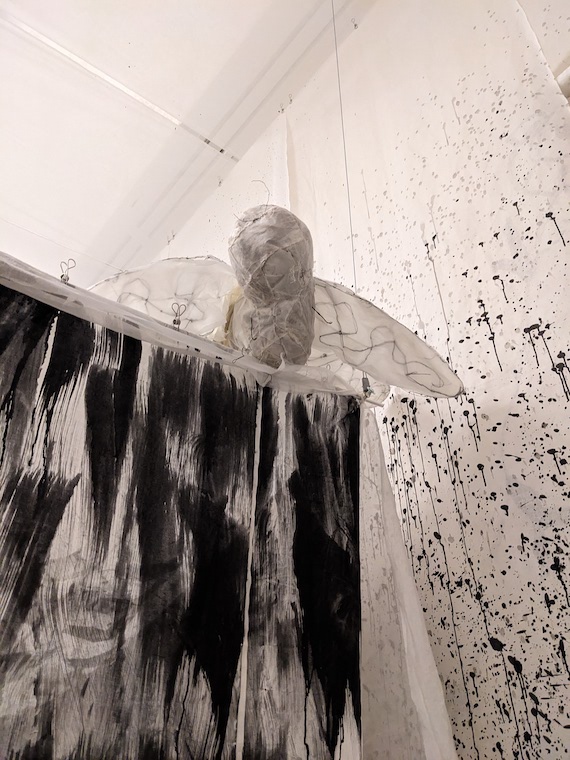
Delaine le Bas at Tate Britain. Photo G Jones
But in case you can’t get to see it, let me tell you about the show. As demonstrated, I don’t know of the artist and have never encountered her work, which is often the best way to go and see something, like watching a film without seeing the trailer.
I was enchanted. Delaine le Bas’s installation, far from being colourful, is in the main ghostly white, with white translucent voile curtains and drapery painted in watery, splashy black. There is a silver maze, and finally, yes, an allowance of colour, but nothing dense or heavy. This whole installation floats.
Delaine le Bas – Like a rave, filtered through art
There is soundscape and music that reminded me of rave music and I wondered if Le Bas could have been a raver. We used to tack up great white sheets on the walls of impromptu illegal raves, held in abandoned warehouses. Due to the speed of arranging these and the fact that they would be quickly torn down (literally torn from the walls) none of these were painted with finesse. Some of these were painted in situ an hour or so before the rave began. It gave them an immediacy and freeness and although Le Bas’s hand is assured, the great sweeps of paint, drips and speed, along with the white material itself and the music gave me a sudden body memory of dancing in a warehouse in a forest. A good memory for me.
Fabric and Sewn Objects
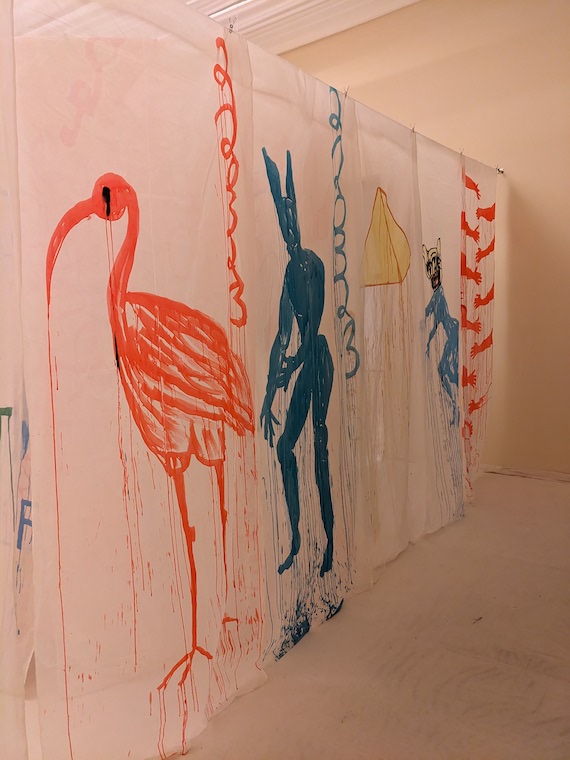
Delaine le Bas at Tate Britain. Photo G Jones
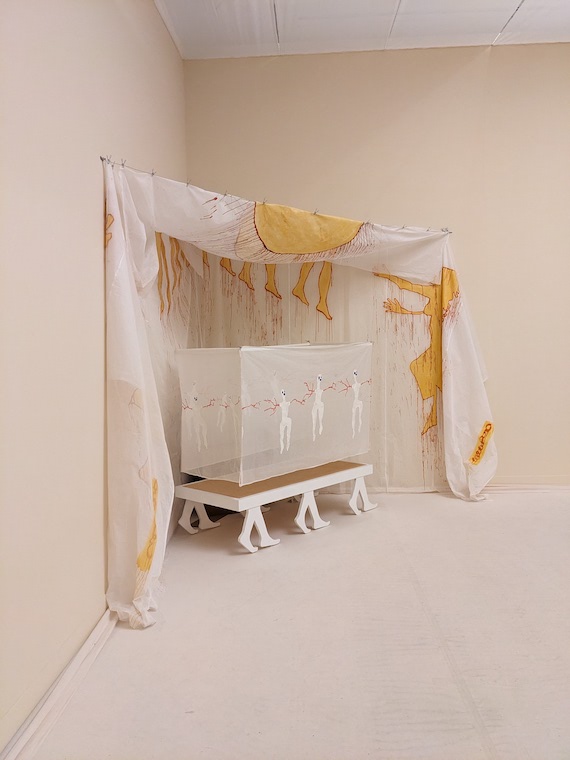
Delaine le Bas at Tate Britain. Photo G Jones
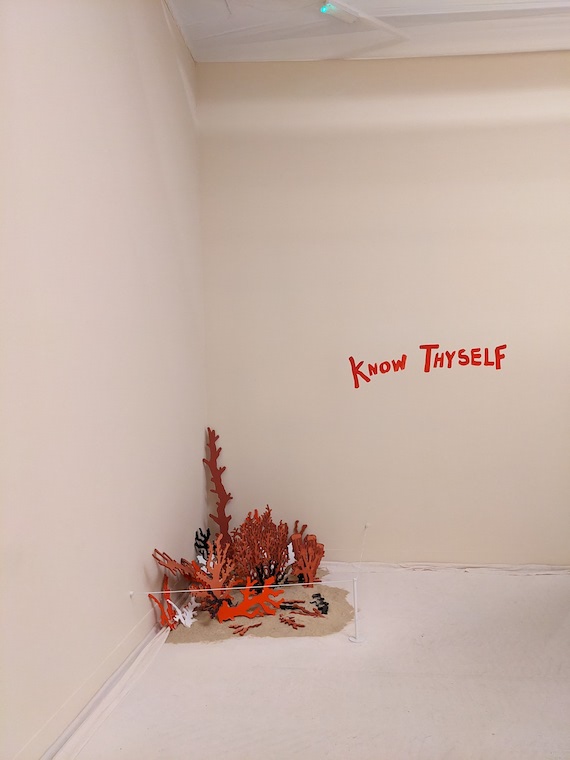
Delaine le Bas at Tate Britain. Photo G Jones
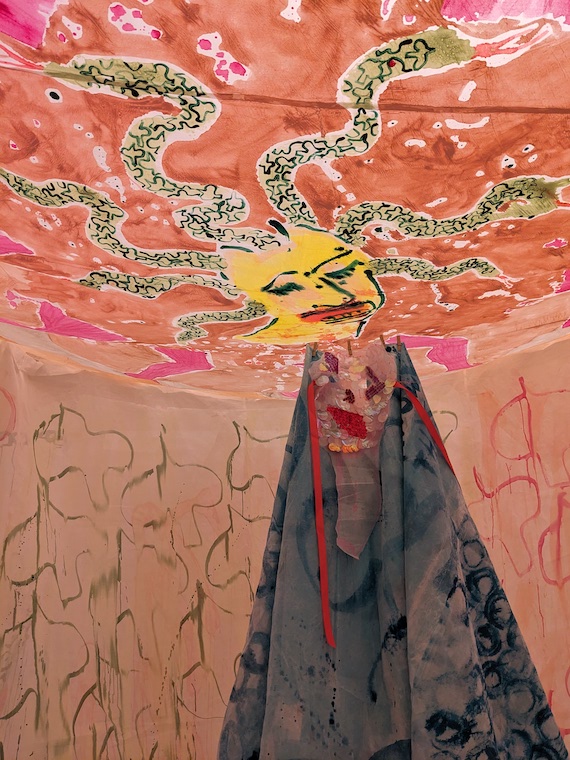
Delaine le Bas at Tate Britain. Photo G Jones
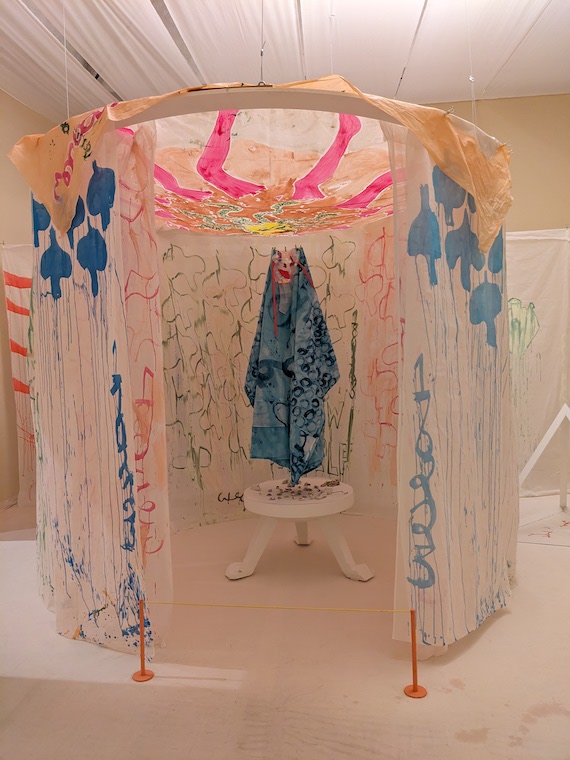
Delaine le Bas at Tate Britain. Photo G Jones
She includes various totems in this first room. A rat in a dress is sewn like a child’s toy, hanging above an altar. A moth perches on the edge of an enclosure. Something of her figures reminded me of Paula Rego and Kiki Smith. In the corner of a silver maze slumps a horse stuffed with hay with little red shoes underneath, in an echo of an ornament that sat in her nan’s cabinet, alongside the artist’s own first pair of shoes. The horse is suspended with many silver wires, like a circus tent. She made the work as her nan was dying, and wondered if it was ok to make art amidst illness, death and chaos. The answer was yes.
In the last room we come to The Oracle. She occupies her own little tent enclosure, as if on display in a Victorian Freak Show. In a corner is written “Know theyself”.
The Turner Prize is on at the Tate Britain until 16th Feb 2025. Entry price varies.


